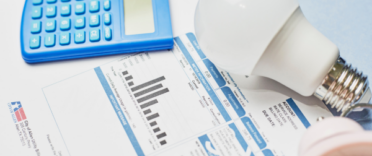The energy price cap is set by the energy regulator Ofgem and is based on the average usage of a dual-fuel household, which means that your actual energy bills may be higher or lower depending on the amount of energy you use.
In this article, we look at the options available to you if you are struggling to pay your energy bills and additional ways that you can try to save money around the home.
How much does energy cost?
The energy price cap increased to £1,787 in January 2025 with further rises predicted for April. It means that now could be a good time for UK households to lock in a good deal by fixing their energy bills for the next 12 months. Remember, how much you actually pay for your energy usage will vary depending on how much gas and electricity you use. Check out our regularly updated article 'Best fixed-price energy deals compared'. We share how much you can expect to pay for appliances around the home in our article, 'How much electricity am I using?' Additionally, you may find our article, 'What is the cheapest way to cook?' useful.
Compare energy deals
Protect yourself against high energy rates by comparing energy deals with Uswitch
- Enter your postcode
- Compare energy deals
- Switch energy in minutes
What to do if you’re struggling to pay your energy bills
If you are worried about the rising cost of energy bills and are struggling to afford the increase there are various schemes and charities available that can offer help and advice. One thing that you must not do is stop paying your energy bills altogether as this can lead to further financial difficulty and damage your credit score which is likely to affect your ability to borrow money in the future. Not only this but as your energy supply can be cut off if you do not pay, energy bill arrears is considered a 'priority debt'. You should therefore prioritise paying this back over another debt e.g. credit cards or water bills.
Below we share some steps that you can take if you find you are unable to afford your energy bills.
Contact your energy supplier
If you are struggling to pay your energy bills one of the first things you should do is contact your energy supplier. Notifying your energy supplier that you are struggling means that they are obliged to help you come to a solution and discuss an affordable way for you to repay them. One thing you can suggest is an affordable payment plan which considers how much you can afford to pay based on your budget as well as your energy usage.
If you are on a prepayment meter and are struggling to pay your electric or gas you should contact your supplier for temporary credit which is applied to your prepayment meter. If you owe your supplier money this may be automatically repaid when you top up your meter. If you are unable to afford these repayments you should notify your provider and come to a temporary solution of a more affordable repayment plan.
If you are unsure who your energy supplier is you can find out by using the following websites: For Gas, use Find My Supplier and for electricity, use Energy Networks Assocation
Pay your bills via your benefits
It may be possible to pay your energy bill debts via your benefits with the Fuel Direct Scheme. If you receive certain benefits, such as Universal Credit and Income Support, you may be able to arrange with your supplier for your debts to be repaid directly from your benefits. How much will be deducted from your benefits varies depending on how much you owe and the debt you are repaying. You can apply for the Fuel Direct scheme via Jobcentre Plus or the Pension Service if you receive pension credit.
Check eligibility for grants and schemes
There are numerous grants and schemes that are available that can help towards the cost of rising gas and electricity bills. You can contact your energy supplier to see if you are eligible for any grants or schemes on offer and some of the schemes are open to everyone and not just the company's customers. For more information on the different schemes available, read our article 'Grants and schemes for help with your energy bills'. In addition, the government introduced the Cost of Living support scheme in early 2022 which provides a package of help for those most vulnerable. We explain more about the support scheme in our, 'Cost of Living Support guide'.
Get free debt help and advice
If you are feeling overwhelmed and struggling to pay your bills there are a number of companies and charities where you can seek free help and advice. Find out where to get free debt advice.
How to save money on energy bills
If you are looking for ways to save money on your bills you can follow some of these money-saving tips. For other ways to save money at home read our article, 'How to save money on your household bills'.
How to save money on your energy bills:
- Control your thermostat - Turning your thermostat down by 1°C can save you up to £75 a year on your heating bill, according to the Energy Saving Trust. In addition, you could turn the radiator down or off in rooms that you do not use.
- Draught proof your home - Draught proofing your home can help to improve its energy efficiency and retain the heat for longer. You can purchase various types of draught excluders including window and door seals.
- Install energy-efficient appliances - If you need to replace or buy a new appliance, pay attention to the energy rating. The higher the energy rating (e.g. A) the more efficient the appliance and the more money you can save using the appliance over a long period of time.
- Service your boiler - Regularly servicing your boiler can help to improve its efficiency and save money on your energy bills by ensuring your home is heating correctly.
- Use the eco settings where possible - If it is possible to use eco settings or lower temperatures on your appliances this can save you money on your energy bills. Eco settings will generally run for longer but at lower temperatures and will therefore use less energy.







